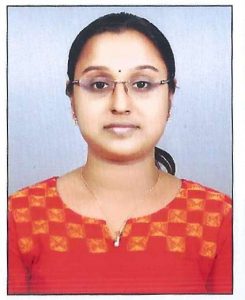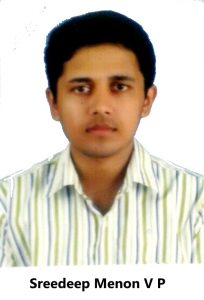Toppers Speak

Megha Bipin
Works under the Ministry of Health and Family Welfare (CGHS)
I cleared SSC CHSL 2016 and I am posted in Ministry of Health and Family Welfare (CGHS). It is not easy to crack this exam until we know the exact strategy of preparation. After joining DOTS Academy, I realized that our attention should be concentrated on a single exam as the method of approach varies from one exam to another.
In SSC Examination, all that matters is our accuracy in tackling the questions in specified time. As the exam is conducted in an on-line mode, practising online mock test on a daily basis is a must. The best way to solve quantitative aptitude section is adopting short cut methods which can save our time when compared to conservative method of approach. General Awareness section nowadays mostly deals with current affairs. Reading newspaper will help in improving vocabulary and general knowledge at the same time. Going through the pattern of questions asked in different shifts of exam will give us an idea on what all topics to concentrate as a part of last minute preparation. Moreover, Academy provides systematically arranged mock test with thorough evaluation and discussions. The class for descriptive exam was also very effective. The best part is that the faculties here are highly optimistic, encouraging, friendly and always willing to clarify our doubts.

Madhavi
51st rank in Secretariat Asst, 27th rank in High Court Asst
Getting a govt job someday was one of my dreams. Luckily, I landed at the right place. I joined here just a few months after completing my degree. It’s been two years and now I’m happy that I’ve got two jobs instead of one.
Role of Dots Academy?
Hardwork assisted by proper guidance always brings success – this is what I have learned from here. Efficient and dedicated faculty is the strength of this institute. I am totally taken by the in depth knowledge of the faculties. They make sure that each and every aspect of the subject included in the syllabus is covered. For Polity and English, I will say Pooja Ma’am is the best. When it comes to History and Quant it is Abraham sir. Preethu Ma’m makes advanced maths easy. Flash tests, periodic revisions, mock tests, descriptive classes, discussions and feedbacks- all ensure good practice.The faculty is always approachable and happy to clear our doubts. They remind us often- “When the going gets tough, the tough gets going”. Thank you Dots Academy for boosting my confidence and guiding me to success.
My preparations
About my preparations, I have attended the classes for one year and strengthened my base. Then studied everything again and practised more in the academy itself. The first step of my preparation was to cover the syllabus. Then I went through the previous question papers to understand the exam pattern. I always followed a timetable of my own and gave attention to the topics in which I am weak. I ensured that I always stick to the syllabus. I worked out the mock tests repeatedly. Proper analysis of mock tests brought huge difference. Current affairs is an inevitable part of competitive exams. I kept myself updated in that.
Importance of putting the brains together
I found my group of friends really helpful. Group studies made it much easier. We always practised together, so that honest feedbacks are got. We revised each topic and even prepared questions of our own all of which really boosted the confidence. We also made sure that we never missed any exam even though we didn’t meet the qualifications. It makes us aware of the mistakes we tend to make in the real exam hall.
Perseverance matters
How much knowledge you have is not what matters. How well you write the exam is all that matters. For this, a proper strategy is to be framed and implemented. Never think of cutoff marks. It varies and depends on many factors which are not in our control. Set an aim of very high marks and work for it. In fact there is no shortcut to get a job. And also can’t say a time limit.
Success is not final; failure is not fatal: It is the courage to continue that counts.

Syam Sankar
“1 st Rank – Civil Polce Officer”
Becoming a topper in an examination is a dream come true for me. But it is not without its share of failures, struggles, dejections and rejections.
I am grateful to all those who have stood by my through the thick and thin.
The importance of sticking on
But one thing is very sure, whatever be the adversary, a strong will can make a person to work harder and harder. I have been in the competitive field for the past two years. There were occasions when I wouldn’t clear any exam. But the sportsman in me always urged me to hang on.
Work strategy
Though I did not have a specific time table, I made it a point to learn each subject every day. For instance, every day I would solve at least 5 problems of Maths, 5-10 English questions including vocabulary and a minimum of 25 GK questions along with some questions from Malayalam language. Studying current affairs was also a part of daily routine. Above all, at the end of the week, I would recollect what I studied every week. This helped me a lot in retaining better.
Apart from this, I would also solve the previous year PSC question papers in a time-bound manner twice in a week. Analysing the solved question paper is as important as solving them, So, when it takes just an hour to solve the paper, it takes around three hours in analyzing and finding out why the other options were not suitable.
Combined study (at Dots Academy even after completing my course) helped me to reinforce the topics. Discussion with peers and framing interesting codes made the study process entertaining.
But this hectic schedule never interfered with my physical activity. Being an athlete, I knew a healthy mind needs a healthy body. I had my usual quota of football or cricket practice either in the mornings or in the evenings.
My suggestions for those in the competitive exam field
- There is no short-cut to success.
- A minimum of 6 months is required to familiarize with any exam whether it is SSC, PSC or Bank.
- Always understand the exam and its pattern before attempting any exam. One becomes lucky with hard work.
- Always practice previous year question papers
- Learn every day, keep yourself active.
- Analyse every exam that you have attended.
- Learn from your mistakes
- Practice, practice and practice.
A focused, determined and organized study is important to crack any exam.
 Preethi Vijayan
Preethi Vijayan
“Selected for MTS 2016-17“
I was lucky enough to crack the SSC MTS examination within a few months of completing my college. About my preparation for the said exam, though all the four sections, ie, QA, Reasoning, English and General Awareness are equally important, I had to devote more time and attention on my QA as I was really poor in numerical skills. QA sessions at DOTs made my concepts strong after which I could practice myself using their worksheets and Kiran’s previous year question bank. The GA section in SSC exam is decisive in determining the candidate’s rank, it should never be ignored. Questions from Ancient India, Micro- economics and Indian Constitution are sure shots. Lucent GK and textbooks from the academy helped me to get through it. Proper revision is indispensible for G.K. I would say doing one genuine book a hundred times is better than reading a hundred books one time, because recollecting what you have read is actually what matters. Questions from current affairs will not be challenging if one is regular in preparing daily notes on important current events. I devoted just an hour each day for reading The Hindu and preparing notes on it. I found that SSC had a palpable interest on topics like recent awards and publications. So keeping a record of this proved helpful. English and reasoning sections required a relatively less effort from my side as enough practice exercises on these were given from my coaching institute itself. Time management is the next big thing when it comes to SSC exams. One online mock test per day is sure to help the aspirants in getting used to the online exam pattern and to keep a check on their answering speed.
During the time of my preparation I shrank to a world of books alone, shut from all the hobbies I enjoyed till then. Thankfully, all those little sacrifices worked and I found myself working in a Central Government Office within a few months. Though it is definitely not my ultimate dream job, I am happy that I have entered the service and I still continue my studies as this year’s CGL is in the offing.

Harikrishnan M S
“Selected for Assistant Audit officer (Gazetted) post in SSC CGL 2016”
Anyone can Crack SSC – CGL*
*conditions Applied
I managed to crack CGL in my first attempt and can say with confidence that with the right strategy, which depends from person to person, anyone can crack CGL. I’ll try to throw some light on how you should approach the exam along with what my strategy was for the same.
- Understand the exam you are appearing for
First and foremost, you must do a thorough research on the exam, in this case CGL, you are appearing for. Although it may sound cliched and complicated, it is quite simple. Follow these simple steps for a start.
- Understand the exam pattern
A quick skimming of the pattern of the exam will give you an idea that out of the total 700 marks the distribution as follows: –- Quant/Data interpretation – 250 marks
- English/writing – 350 marks
- Reasoning – 50 marks
- GK – 50 marks
This means that Quant and English constitute 600/700 marks and this is where one should spend my Lion’s share of time.
- Understand the distribution of marks for each chapter.
Almost 100/200 in the Quant section of T2 come from 4 chapters namely- Algebra
- Mensuration
- Geometry
- Trigonometry
So ideally one should spend more time practising these 4 topics.
- Know the posts that you are applying for
A rookie mistake that many do is not applying for the post of AAO. The post of AAO, contrary to misinformation, is the most rewarding profile in CGL. It is the only Gazetted post and highest Grade Pay post at 4800 with automatic conversion of 5400 in 4 years. Other posts take ages to reach 5400 Grade pay.
These tips are only to give you a direction that you might want to take. Try to do more analysis and research on the exam at your will. Anyone can crack this exam.
- Everyone is unique
It is important to understand that every one of us is unique. So, my strategy might not work for you or the topper’s strategy might not work for the person ranked 2. When we start preparing for the exam everyone will be at different level of preparation and skill. So, one must prepare according to one’s strength/weakness. I personally didn’t do much preparation for Tier 1 apart from mock tests. In tier 2 I practiced the 4 chapters, that I mentioned, sentence correction from English and took loads of mock tests. This worked for me because my base level of aptitude was above average before I started preparation. This strategy will be a disaster for those who need to cover the basics of the portions. So, understand your weakness, be honest in assessing your strength and work on the portion you are bad at. Anyone can crack this exam.
- Success is 10% taking mock tests and 90% analysing it.
Mock tests played a very important part in my preparations. Mock tests taught me more than any book.
- Be honest!
Cheating and scoring high in online mock tests may give you instant gratification and claps from classmates but if job is what you are after then please be truthful to yourself while taking mock tests however poor you are going to score. Also, don’t take breaks during the tests, that’ll defeat the very purpose of it.
- Find your critical path
The order of exam in tier 1 is Reasoning -GK-Quant-English. While doing mock tests try to shuffle the order in each exam and analyse how your average scoring is. This will help you get the ideal order of taking each section. As for me, my critical path is Reasoning – Quant half – Gk – English – Quant rest – recap. This route consistently fetched me marks above 150 in mock tests and in final exam. Similarly find the best path for you. This will help you in pushing your marks by at least 5-10 marks. Remember 1 marks equals close to 500 ranks. This could make or break the exam for you.
- Do an in-depth analysis of your mock tests.
After doing 10 odd mock tests I realised that my scores weren’t that high. So, I list down the total number of questions I skipped or got wrong from each topic. This gave me an idea that I was terrible at sentence correction, direct indirect speech, active passive, algebra and some other topics. So, I spent more time getting the basics of these topics right and then took more mock tests. This dramatically improved my scores.
- Revise your mock tests
There is no use taking the mock tests if you are not going to thoroughly understand the questions you got wrong. While going through the answers you’ll realize that there are some questions you skip as soon as you see it, or some questions which are brilliant. Star these questions for future revision either by taking a print out or taking a screenshot. This will help you in your last-minute revisions. Remember making a mistake is natural, making the same mistake twice is criminal. - Let go off your Ego!
Don’t let your ego that you can solve any question in this world get in between you getting a lucrative job. Time is ticking and you cannot afford to spend more than 2 minutes (ideally 1 minute) even on the most difficult of questions. So, skip the questions without shame. You can always come back to them at the end. - Get into the head of the question setter and the understand the environment
This will come to you only with the experience of a lot of mock tests. Almost every set of question paper (especially t2) will have a bias. For example, 2017 T2 quant paper had very difficult advance mathematics and very simple arithmetic. So, a clever student who manages to understand the trend of questions will skip the difficult questions of advance maths after a quick read and cakewalk through the simple arithmetic questions. Moreover, in the computer system in which I was sitting, I had to scroll both horizontally and vertically to see the complete geometric figure. This was again time consuming, so I skipped them and kept it for last. My 2017 score – 158 – Quant, 180 – English. Anyone can crack this exam. - Fine tune yourself.
For time bound competitive exams like CGL, presence of mind is of utmost importance. A bad mood can undo the yearlong hard work. Make your body clock right at least 2 weeks before the exam. Try to take mock tests exactly at the time of the day when you’ll have your actual exam. This will help you fine tune your mental ability. Don’t skip your breakfast, also don’t eat heavily before exam. Have a good night sleep the day before. Some students do really well under pressure, So I won’t say don’t get tensed or scared. Anyone can crack this exam. - My Strategy
This should be the least important part in this write up. Nonetheless sharing what I did.
I did self-study for t1 and t2 and took the help of Dots Academy in T3. Preparation for CGL was all mock tests and revision of the same. I took close to 25 mock tests and revised the same for t1 and t2.- Reasoning
My strongest section – No strategy as such – I consistently scored 48-50 in this section. Key is to practice a lot enough to reduce time on reading the questions. When you do mock tests, you’ll realize that there are some sets which have very long question text. So, during actual exam you will be able to skip reading these questions and straight away be able to solve it since you already know what the question is intending to ask. Finish this section fast. - GK
My weakest section – Didn’t do any SSC specific reading. I did revise the 25 questions from all the mock tests I took. That came in handy. My score was around 25-35 in this section. As I said ROI is too low. Finish this section very fast.
- Reasoning
- Quant
Average section – Quant is all about practice and not making the same mistake twice. SSC quant questions are repetitive. So, if you’ve done enough mock tests and revised the same, this portion will fetch you good marks. And practicing questions again and again and again will give you that speed you were always lacking. I used to score 40-45 in this section in t1 and 150-160 in t2
- English
This is a very important section for Keralites since our fundamentals in English is comparatively better than that of competitors. This section will help us negate the marks by which we fall back in Quant section against competition. Perfect example is 2017 t2 exam where on an average we scored really high in English but was down by 10-15 marks in Maths. I was really bad in sections like Sentence correction, Direct indirect etc. Out of 10 questions in sentence correction I used to get 6-7 wrong. So I googled sentence correction pdf, downloaded couple of the sets. Sat and did those 2000-3000 questions religiously. This dramatically increased my accuracy. I used to score 40-45 in t1 and 160-185 in t2. - Tier 3
My association with Dots academy starts with T3. Since I wasn’t really good at framing good exam-oriented essays or letters, help was very much needed. Dots academy helped me find the right approach to framing good essays and reducing my grammatical errors. The topics given by Dots helped in getting an overall template answer practice. Moreover, topics that we actually practiced (Earthquakes, demonetization) came as the topics in both 2016 and 2017s T3 exam. Making groups for discussions really helped in this stage. - Tier 4
Don’t worry about T4 now. It is Microsoft word, PowerPoint and excel. Think about it only after T3. 2-3 days of practice will sail you through this tier.
So be confident, make study groups, practice a lot, do a lot of mock tests and success will come to you. All the best. Anyone can crack this exam.

I joined Dots Academy in 2017 to prepare for the 2017 CGL examination. The tier 1 exam was conducted in August and unfortunately I was not able to crack it. For the next CHSL/CGL to occur it would take at least 6-7 months and also by that time I understood that SSC was very punctual… in delaying the exams. The 2017 CGL scam case further worsened the situation. So I thought of giving other exams a try and majority of them were bank exams.
My initial notion about bank exams was that it was completely different from SSC and required special preparation for one to crack them. But after attempting multiple tests I realized that the area of syllabus from where the questions came was more or less the same as that of the SSC. In fact I consider SSC of having a vast syllabus than that of the bank. So the one thing that mattered the most was how we approached the exam and for that we need to be familiar with the pattern of the exam.
Bank exams are conducted in 3 stages – Preliminary, Mains and Interview along with GD. The prelims is a 1 hour long test for 100 marks. It consists of 3 sections –
Reasoning (35 marks), Quantitative Aptitude (35 marks) and English section (30 marks), each having a time limit of 20 minutes. For the mains the division is different for clerical and PO.
Clerical Mains
| No of Qns. | Marks | ||
| Reasoning Ability | 45 | 60 | 60 minutes |
| English Language | 35 | 40 | 40 minutes |
| Data Analysis and Interpretation | 35 | 60 | 45 minutes |
| General, Economy/Banking Awareness | 40 | 40 | 35 minutes |
| Total | 155 | 200 | 180 minutes |
PO Mains
| No of Qns. | Marks | ||
| English | 40 | 40 | 35 minutes |
| Quant Aptitude | 50 | 50 | 45 minutes |
| Reasoning Ability | 50 | 60 | 45 minutes |
| General/Financial Awareness | 50 | 50 | 35 minutes |
| Total | 190 | 200 | 2 hours 40 minutes |
The preparation I had done for SSC helped me tremendously at each level of this exam and here it was how it helped me.
English
English was my favourite section as I was able to attend almost every question with high accuracy. The questions are not so direct like that in SSC but going through 2 or 3 model question papers are enough to get a grasp of it. If you are a serious SSC aspirant then you will be preparing for Tier 2 level from the get go which is more than enough to score high in this section and this will play a key role in cracking the examination.
Quantitative Ability
The questions from this section usually come from simplification, sequence & series, data interpretation and miscellaneous which is actually whatever we study for SSC, i.e., Profit & Loss, Mixture & Allegation, Time & Distance, Work & Time etc. The proportion of questions from miscellaneous section was quite high and this certainly came as an advantage for me. Also there were a lot of easy questions from simplification & data interpretation and I made sure that I attempted them all before turning to the miscellaneous section in order to increase the attempt.
The Mains of the exam have majority of its questions from Data Analysis and Interpretation. It will usually be a combination of multiple topics like Profit & Loss along with Work & Time, or Mixture & Allegation along with Profit & Loss etc. The ability to perform well in this section depends on your ability to understand the questions. For that you have to be familiar with them and practice is the only way to deal with that. The good attempts in this section always range between 10 to 15 questions out of the total 35.
Reasoning Ability
This was the only section that I found a lot different from the questions that were asked in SSC. There were questions from seating arrangement, puzzles, inequalities, Input Output etc. There were topics that was common to SSC like syllogism, blood relation etc. but difficulty of those questions were bit more than those asked in SSC. I usually practised around 5 questions every day for a month to get comfortable in this section. The ‘art of skipping’ proved very effective for me in this section to find the easy questions and increase the attempt. 15 – 20 questions out of 45 are again usually considered as good attempt for this part.
General Awareness (for Mains only)
This is one another section where you can score very high. In fact you can score full if you are well versed in current affairs. New government schemes, banking awareness, budget related questions are all covered in this section. I used to follow Adda’s Hindu monthly review for preparing current affairs in SSC and this helped me a lot to get through this section.
In addition to these 4 sections there is a descriptive test of 30 minutes duration consisting of a letter and essay for a total of 50 marks.
The preparation for SSC is not alone enough to crack bank exams, but what you study there will surely help you to have a fundamental base for attempting any exams of the same level. By putting an extra effort in understanding the pattern and finding a suitable strategy will surely help you to succeed in any exams. In my case I focused on accuracy more than the number of attempts, so even while having average attempts I was able to obtain decent marks. Also I considered bank exams as a backup option and getting through each level as a bonus. This helped me in maintaining composure throughout the exam which further helped in reducing unnecessary careless mistakes.
Lastly I would like to thank everyone at Dots Academy, especially Pretty Sir, Pooja miss and Preethu miss for their support, timely guidance and extreme dedication without which this would have been an uphill task.
